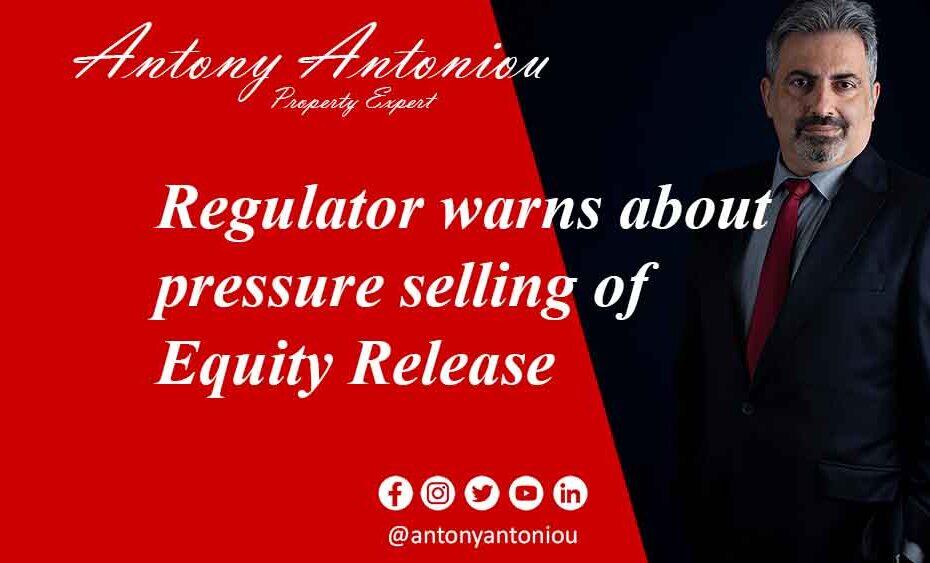Regulator warns about pressure selling of Equity Release
The Dark Side of Equity Release: How Seniors Are Being Pressured Into Risky Loans
Equity release loans allow older homeowners to unlock tax-free cash from their properties. But beneath the appealing pitch lies a murky industry preying on seniors through high-pressure sales tactics and misleading advice. I’ll break down the troubling practices that regulators have recently uncovered and provide tips to protect yourself or your loved ones.
What is Equity Release?
Equity release loans, also known as lifetime mortgages, provide a lump sum to homeowners aged 55+ based on the value of their home. Unlike a traditional mortgage, borrowers don’t make monthly payments. Instead, interest accrues until the property is sold or transferred.
This type of loan appeals to “property rich, cash poor” retirees seeking to supplement retirement funds. But complex terms and astronomical interest rates can quickly swallow all remaining home equity.
The Seductive Promise of Equity Release
It’s easy to be seduced by equity release marketing promising extra retirement income and financial freedom. Ads evoke dreams of travel, home renovations, and enjoying life without money worries. What often goes unsaid, however, are the ruinous downsides.
Pro tip: Before pursuing equity release, make sure you understand both sides of the story. Don’t rely on lender marketing alone.
The Ugly Truth of Equity Release Loans
While equity release may offer short-term gain for some borrowers, it can have disastrous long-term consequences, including:
– Skyrocketing Debt – Average interest rates of 6-7% mean loan balances can double in less than 10 years.
– Loss of Inheritance – All remaining home equity could eventually be swallowed up, leaving nothing for heirs.
– Limited Protections – Equity release falls between regulatory cracks, lacking key consumer protections.
– Irreversible Decision – Once signed, lifetime mortgages are difficult and costly to exit.
– Scant Alternatives – Many advisers fail to mention safer options like downsizing.
For children of borrowers, watching their family home and inheritance disappear can be heartbreaking. And the complex lending structures make reversing harmful equity release loans nearly impossible.
Wolves in Sheep’s Clothing: Unethical Sales Practices
While equity release may legitimately help some cash-strapped retirees, regulators have flagged alarming predatory behavior from leading UK lenders.
The Financial Conduct Authority (FCA) recently investigated firms responsible for 50% of lifetime mortgage sales. The findings revealed systematic manipulation of vulnerable seniors through:
– Fear-Based Marketing – Exploiting anxieties over retirement costs to push equity release.
– Commission-Driven Advice – Advisers prioritizing sales volume over client needs.
– Poor Assessments – Failing to analyze a borrower’s full financial situation.
– Omission of Alternatives – Not informing seniors of safer options like downsizing.
These practices directly contradict ethical lending standards. But with lucrative commissions at stake, equity release advisers are incentivized to closed sales at any cost.
How Can Seniors Avoid Predatory Lending?
When pitched equity release, it’s essential to protect yourself by:
– Asking tough questions – Don’t be afraid to challenge anything that seems off.
– Bringing an advocate – Have a trusted confidante present to help scrutinize.
– Researching thoroughly – Understand all costs, terms and alternatives first.
– Verifying credentials – Check qualifications and regulatory standing of any advisers.
– Reading the fine print – Take time to analyze any contracts in detail.
– Exploring alternatives – Determine if downsizing or other options may be safer.
– Consulting attorneys – Seek legal guidance to ensure your interests are protected.
– Delaying decisions – Don’t be rushed into signing anything quickly.
Transparency and healthy skepticism are crucial when navigating the murky equity release market. Prioritize your future safety over advisers’ commissions.
Safety First: Seeking Secure Retirement Financing
While equity release merits cautious consideration, jumping straight to tapping home equity is often unwise. First pursue safer options that won’t put your future at risk, including:
– Downsizing to a smaller home. This frees up cash while reducing expenses.
– Renting out extra rooms. This provides income without interest obligations.
– Investing conservatively. Steady indexed funds offer growth without excessive risk.
– Trimming expenses. Look at cutting non-essential costs.
– Working part-time. Even modest earnings can supplement retirement funds.
– Checking eligibility for benefits. Many overlook programs that could offer a lifeline.
With some creative thinking, it may be possible to generate supplemental retirement income without gambling your financial future on equity release loans. But if you do opt to borrow, proceed with extreme caution. Prioritizing your interests over lenders’ profit motives is key to avoiding regrets.

